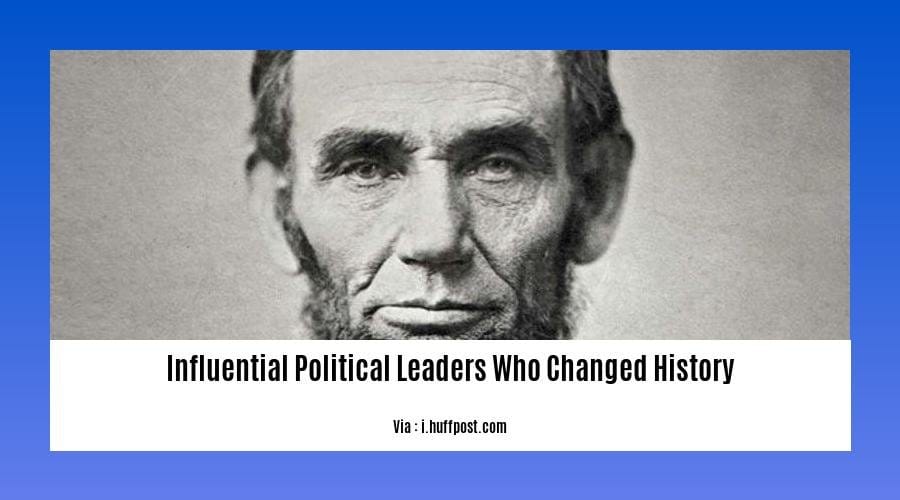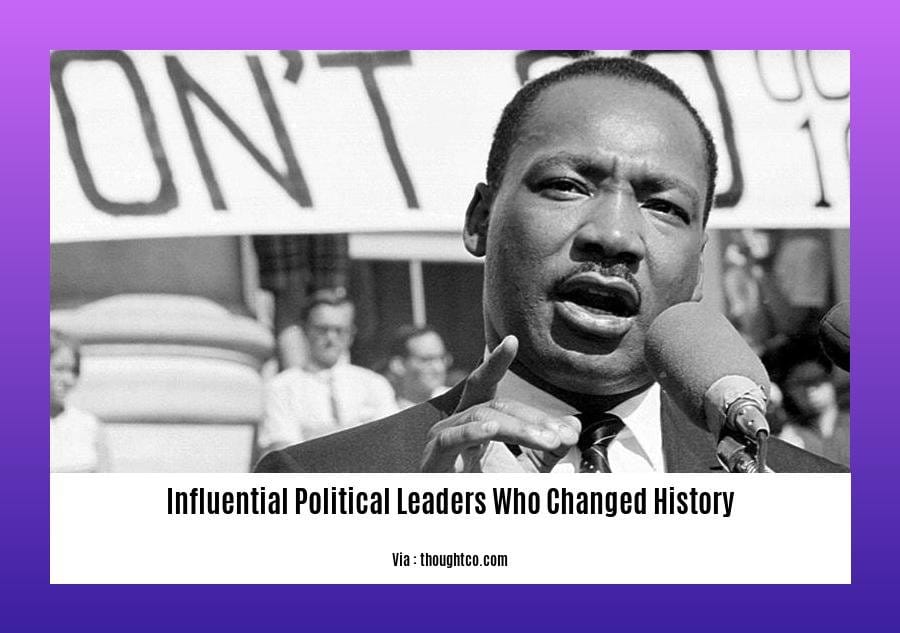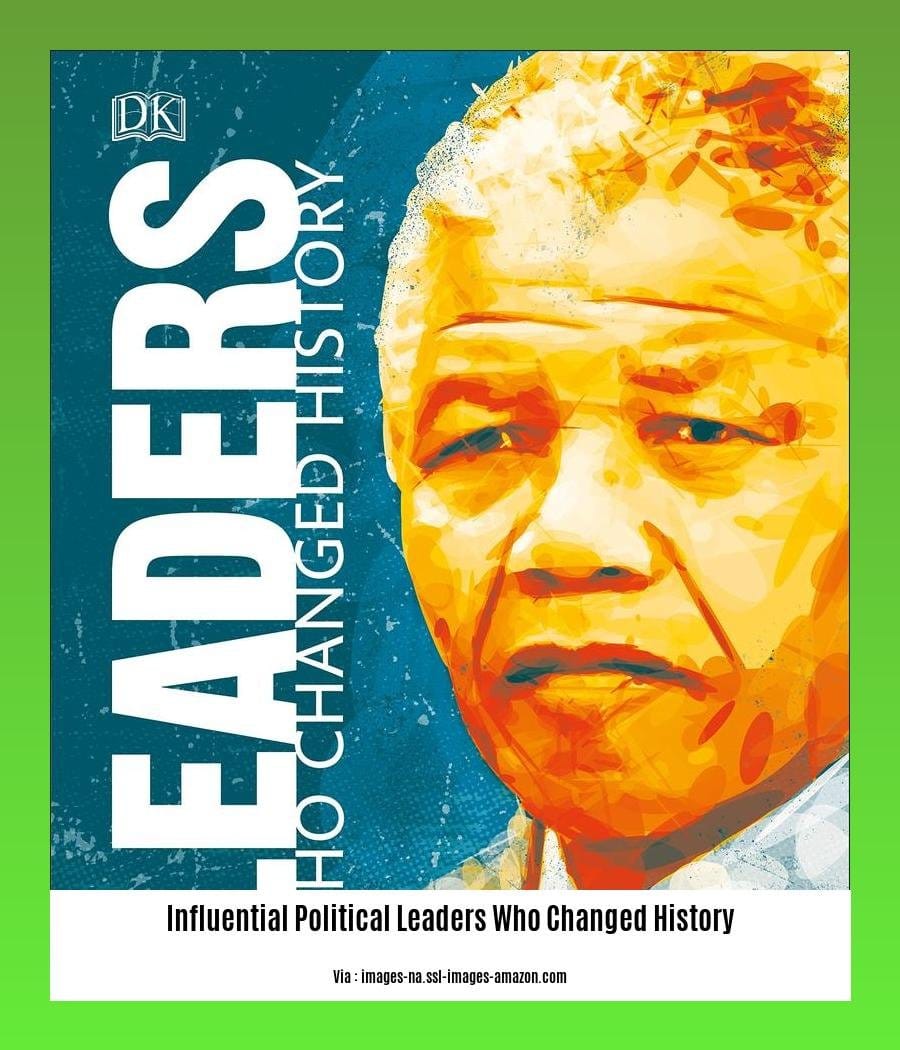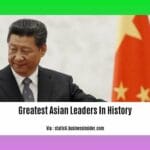Embark on a historical journey as we delve into the lives of “Influential Political Leaders Who Transformed History.” These exceptional figures left an indomitable mark on the political landscape, their decisions and actions shaping the destinies of nations and the very fabric of our world.

Key Takeaways:
- History tutoring offers personalized support from experts, tailored to assist with history-related assignments and preparation.
- Influential world leaders, including Hammurabi, Cyrus the Great, Pericles, Qin Shi Huang, and Alexander the Great, left significant imprints on their civilizations.
- Each leader possessed distinct leadership styles and contributed uniquely to shaping their respective eras.
Influential Political Leaders Who Changed History
History is shaped by the actions of individuals, and certain political figures have had a profound impact on the course of human events. From ancient rulers to modern statesmen, these influential political leaders have left an enduring legacy that continues to shape our world today.
Hammurabi: The First Lawmaker
Hammurabi, the sixth king of Babylon, is credited with creating one of the earliest known written codes of law. His Code of Hammurabi, dating back to around 1750 BC, established a system of justice based on the principle of retaliation, known as “an eye for an eye.” This code played a significant role in the development of legal systems throughout the ancient world.
Cyrus the Great: The Persian Conqueror
Cyrus the Great, founder of the Persian Empire, was known for his military prowess and his relatively tolerant rule. He conquered vast territories, including Babylon and Egypt, creating one of the largest empires in history. Cyrus’s policies of religious toleration and support for the arts contributed to the growth of Persian culture.
Pericles: The Athenian Democrat
Pericles, the leader of Athens during the “Golden Age,” is considered one of the greatest statesmen in ancient Greece. He established a democratic system of government that gave citizens a voice in their own governance. Under his leadership, Athens became a center of culture, philosophy, and the arts.
Qin Shi Huang: The First Emperor of China
Qin Shi Huang, the first emperor of a unified China, is remembered for his authoritarian rule and his ambitious projects. He standardized weights and measures, created a unified writing system, and built the Great Wall of China, a massive defensive fortification.
Alexander the Great: The Macedonian Conqueror
Alexander the Great, king of Macedon, was one of the most successful military commanders in history. In just 13 years, he conquered a vast empire stretching from Greece to India. Alexander’s military tactics and administrative reforms had a lasting impact on the development of Western civilization.
Dive into the chronicles of power and influence with our meticulously curated list of the famous political leaders in history. Discover the most famous political leaders who shaped the course of history and left an enduring legacy. Explore the profiles of the greatest political leaders of all time, whose vision and leadership transformed nations and inspired generations.
Napoleon Bonaparte: The Emperor of Europe
Key Takeaways:
- Born: August 15, 1769, in Ajaccio, Corsica
- Married: Josephine de Beauharnais in 1796 (divorced 1809)
- Rise to Power: Led France through Napoleonic Wars after the French Revolution
- Overthrew French Directory: 1799 Coup d’état, establishing himself as First Consul
- Crowned Emperor: 1804
- Reign: Marked by military victories and political reforms (Napoleonic Code)
- Defeat: Battle of Waterloo in 1815
- Exile and Death: Died on the island of St. Helena in 1821
His Legacy
Napoleon Bonaparte emerged from the chaos of the French Revolution to become one of the most influential figures in European history. His military prowess, political reforms, and enduring legacy continue to captivate historians and leaders alike.
A Master of War and Diplomacy
Napoleon’s military campaigns reshaped the map of Europe. From the Italian front to the shores of Egypt, his armies conquered vast territories, spreading French ideals and challenging the old order.
Beyond the battlefield, Napoleon proved himself a skilled diplomat. He negotiated peace with Austria and Russia, temporarily achieving stability on the continent. His concordat with the Catholic Church, the Concordat of 1801, restored religious harmony after the turmoil of the Revolution.
A Legacy That Lives On
Napoleon’s reign ended at the Battle of Waterloo, but his legacy lived on. The Napoleonic Code, a comprehensive legal system, became the foundation for civil law in many European countries. His military tactics inspired generations of generals, and his administrative reforms left a lasting mark on French governance.
Today, Napoleon Bonaparte: The Emperor of Europe remains an enigmatic and polarizing figure. Some view him as a brilliant strategist and a force for change, while others condemn his authoritarian rule and his pursuit of war. Yet, there is no denying the transformative impact he had on Europe and the world.
Citation:
- “Napoleon Bonaparte.” World History Encyclopedia, https://www.worldhistory.org/Napoleon_Bonaparte.
Winston Churchill: The Leader Who Defied the Nazis
The face of leadership, courage, and defiance in the face of adversity, Winston Churchill was a pivotal figure whose legacy continues to inspire generations. During World War II, he stood as a beacon of hope, leading his nation through some of its darkest hours.
Key Takeaways:
- Winston Churchill served as Prime Minister of Great Britain during World War II.
- His inspiring speeches and unwavering determination rallied the British people and boosted their morale.
- Churchill played a crucial role in shaping the Allied strategy and contributed to the eventual defeat of Nazi Germany.
Churchill’s Rise to Leadership:
Growing up in an aristocratic family, Churchill’s path to power was paved with education and military service. After graduating from Harrow School and the Royal Military College, he served in the British Army and gained valuable experience that would later serve him well as a leader.
The Darkest Hour:
When Nazi Germany invaded Poland in 1939, Churchill’s moment to shine arrived. Appointed Prime Minister in 1940, he inherited a nation on the brink of collapse. With the Nazis at the gates, Churchill’s speeches became a lifeline for the British people, instilling in them a sense of resilience and determination.
Unwavering Resolve:
Despite the dire circumstances, Churchill never wavered in his belief that Britain would prevail. His refusal to surrender and his unwavering resolve became a source of strength for his nation. Churchill’s leadership inspired not only the British people but also Allied forces worldwide, uniting them against the common enemy.
A Legacy of Leadership:
Winston Churchill’s legacy is marked by his unwavering determination, his ability to inspire his people, and his profound impact on the course of history. He remains an iconic figure, admired for his courage, resilience, and the way he guided his nation through its darkest hour.
Most Relevant URL Source:
- Winston Churchill: The Indomitable Leader Who Shaped History
Nelson Mandela: The Anti-Apartheid Revolutionary
Key Takeaways:
Challenged the unjust system: Mandela confronted the oppressive apartheid regime with unwavering determination, mobilizing support for the anti-apartheid movement.
Sacrificed his freedom: Mandela’s 27-year imprisonment for fighting apartheid became a symbol of resilience and the struggle for justice.
Promoted reconciliation: Upon his release from prison, Mandela played a crucial role in fostering unity and reconciliation, emphasizing the need to heal the wounds of the past.
Established a democratic South Africa: Mandela’s presidency oversaw a peaceful transition to democracy, marking a transformative chapter in South Africa’s history.
Global icon for justice: Mandela’s legacy transcends South Africa, inspiring countless activists and leaders worldwide to fight for human rights and equality.
Most Relevant URL Source:
Nelson Mandela: The Man and His Mission















